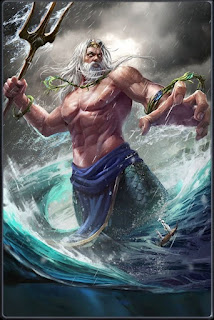POSEIDON
Poseidon, the mighty Greek god of the sea, earthquakes, and horses, has captivated imaginations for millennia. His image, often depicted as a powerful figure wielding a trident, evokes the vastness and power of the ocean. But beyond the iconic image lies a complex and fascinating deity with a rich history and enduring influence.
Poseidon's origins are steeped in the vibrant tapestry of Greek mythology. He is the son of the titans Cronus and Rhea, and brother to the powerful deities Zeus, Hades, Demeter, Hera, and Hestia. After the overthrow of the titans, the three brothers – Zeus, Poseidon, and Hades – divided the cosmos among themselves. Poseidon's domain, the vast and unpredictable ocean, reflected his own powerful and sometimes volatile nature.
While Poseidon is most commonly associated with the sea, his dominion extended beyond the waves. He was also considered the "Earth-Shaker," wielding power over earthquakes and tsunamis. This dual role solidified his position as a force to be reckoned with, capable of both immense beauty and destructive power.
The influence of Poseidon transcended the borders of ancient Greece. The Romans adopted him as their own god of the sea, Neptune, further solidifying his place in the pantheon of deities. Even in modern times, Poseidon continues to inspire artists, writers, and even video game developers, a testament to his enduring legacy.


Comments
Post a Comment